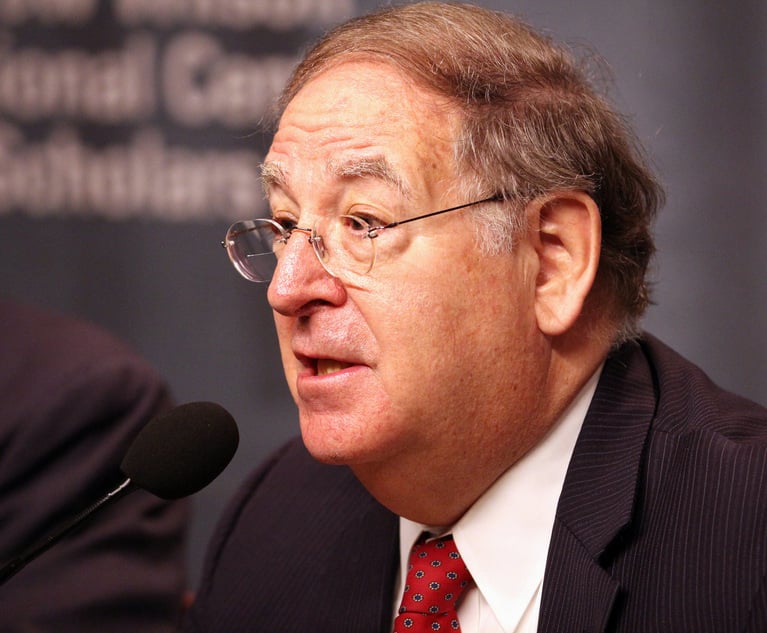Case Linking Talc, Mesothelioma Dropped on Eve of Seattle Trial
Plaintiff's lawyers who allege that baby powder caused a woman's mesothelioma have voluntarily dismissed their case against Johnson & Johnson less than a month before a scheduled trial.
February 26, 2018 at 07:16 PM
4 minute read
 Photo: Alexander Tolstykh/Shutterstock.com
Photo: Alexander Tolstykh/Shutterstock.com Plaintiff's lawyers who allege that baby powder caused a woman's mesothelioma have voluntarily dismissed their case against Johnson & Johnson less than a month before a scheduled trial.
In the case—which would have been the third of its kind to go to trial—the plaintiff linked the New Jersey conglomerate's ubiquitous product to mesothelioma, a deadly form of lung cancer. The first trial ended last November in a defense verdict in Los Angeles Superior Court, and a second trial began last month in Middlesex County, New Jersey, Superior Court.
Darron Berquist, managing attorney of The Lanier Law Firm's asbestos litigation practice in New York, and lawyers at Weinstein Couture in Seattle filed a motion for voluntary dismissal on Feb. 22 on behalf of plaintiff Jody Ratcliff, who brought her lawsuit in 2016. King County Superior Court Judge John Erlick in Kent, Washington, held a hearing on Feb. 8 on Johnson & Johnson's summary judgment motion but had yet to rule.
The case was set to go to trial on March 12.
➤➤ Get class action news and commentary straight to your in-box with Critical Mass by Amanda Bronstad. Learn more and sign up here.
Johnson & Johnson attorney Peter Bicks of Orrick, Herrington & Sutcliffe in New York, said that the dismissal, when combined with the defense verdict in California and a Nov. 17 summary judgment ruling in another California case, confirms what “50 years of independent testing,” including by the U.S. Food and Drug Administration, have shown: “Johnson & Johnson's baby powder is safe and does not contain asbestos. Plaintiff's counsel was smart to drop the case because the judge was onto their 'junk science' and was less than a day away from making critical rulings they feared.”
Orrick and Seattle's Bennett Bigelow & Leedom represented Johnson & Johnson in the case.
Mark Linder, of The Lanier Law Firm in Houston, provided this statement for the plaintiff's team: “J&J talc had and has asbestos in it. We have no doubt about that, or that the science supports asbestos disease. There are lots of reasons to dismiss cases, and J&J's PR machine has not been exposed to our attorney-client reasons for the dismissal.”
Johnson & Johnson has challenged the scientific evidence behind the talcum powder cases, both involving ovarian cancer and mesothelioma. In 2016, Atlantic City, New Jersey, Judge Nelson Johnson granted summary judgment to Johnson & Johnson in an ovarian cancer case after criticizing the “made-for-litigation” methods of two plaintiffs' experts. And, in another ovarian cancer case, Superior Court Judge Maren Nelson in Los Angeles reversed a $417 million verdict last year after concluding that plaintiff's attorneys had failed to provide evidence that talcum powder caused their client's ovarian cancer.
Those lawsuits are among thousands that have alleged Johnson & Johnson's talcum powder products caused women to get ovarian cancer. Several have ended in eight-digit verdicts for plaintiffs.
In the mesothelioma cases, however, verdicts against other companies have been much smaller. Johnson & Johnson has insisted that its baby powder never contained asbestos, a known carcinogen. In the Seattle case, Johnson & Johnson cited testing done by the Harvard School of Public Health and Mount Sinai Medical Center, and the FDA's own conclusion, showing that its talc products didn't contain asbestos. Its lawyers also cited the “litigation-driven analysis” of one of the plaintiff's experts, who “conducted their tests on talc products obtained by other plaintiffs' lawyers from a hodgepodge of sources, including purchases from unknown internet collectors.” Plaintiff lawyers responded with studies of their own and complained that Johnson & Johnson had limited their discovery.
At the hearing, Erlick, who already granted summary judgment to most of the 62 other defendants in the case, raised questions about one plaintiff's expert's report that relied on 32 samples of baby powder, some of which were purchased on eBay. That expert, William Longo, is a plaintiffs' expert in the New Jersey and California trials.
The judge also questioned statute of limitations issues in the case. The plaintiff initially was diagnosed with peritoneal mesothelioma, which generally hasn't been tied to asbestos. But Erlick said her lawyers now insisted that the disease was linked to asbestos, raising statute of limitations issues.
“Well, you're making my job very easy because I'm going to grant the defendant's motion on summary judgment on statute of limitations,” he said.
This content has been archived. It is available through our partners, LexisNexis® and Bloomberg Law.
To view this content, please continue to their sites.
Not a Lexis Subscriber?
Subscribe Now
Not a Bloomberg Law Subscriber?
Subscribe Now
NOT FOR REPRINT
© 2025 ALM Global, LLC, All Rights Reserved. Request academic re-use from www.copyright.com. All other uses, submit a request to [email protected]. For more information visit Asset & Logo Licensing.
You Might Like
View All
Read the Document: DOJ Releases Ex-Special Counsel's Report Explaining Trump Prosecutions
3 minute read
Crypto Exchange’s ‘Meteoric Rise’ Leads to Nationwide Class Action Trend
4 minute read
Veteran Federal Trade Law Enforcer Joins King & Spalding in Washington
4 minute read
'Thoughtful Jurist': Maryland US District Senior Judge Messitte Dies After Short Illness
4 minute readTrending Stories
- 1SEC Files Lawsuit Against Elon Musk Over Untimely Twitter Ownership Disclosure
- 2Survey Finds Majority of Legal Professionals Still Intimidated by AI Despite Need to Streamline Mounting Caseloads
- 3FTC Launches Inquiry of Single-Family Rental Home 'Mega Investors,' Issues PBM Report
- 4Womble Bond Dickinson's Wilmington Office Sees New Leadership as Merger Is Completed
- 5Defending Against a $290M Claim and Scoring a $116M Win in Del. Drug Patent Fight
Who Got The Work
J. Brugh Lower of Gibbons has entered an appearance for industrial equipment supplier Devco Corporation in a pending trademark infringement lawsuit. The suit, accusing the defendant of selling knock-off Graco products, was filed Dec. 18 in New Jersey District Court by Rivkin Radler on behalf of Graco Inc. and Graco Minnesota. The case, assigned to U.S. District Judge Zahid N. Quraishi, is 3:24-cv-11294, Graco Inc. et al v. Devco Corporation.
Who Got The Work
Rebecca Maller-Stein and Kent A. Yalowitz of Arnold & Porter Kaye Scholer have entered their appearances for Hanaco Venture Capital and its executives, Lior Prosor and David Frankel, in a pending securities lawsuit. The action, filed on Dec. 24 in New York Southern District Court by Zell, Aron & Co. on behalf of Goldeneye Advisors, accuses the defendants of negligently and fraudulently managing the plaintiff's $1 million investment. The case, assigned to U.S. District Judge Vernon S. Broderick, is 1:24-cv-09918, Goldeneye Advisors, LLC v. Hanaco Venture Capital, Ltd. et al.
Who Got The Work
Attorneys from A&O Shearman has stepped in as defense counsel for Toronto-Dominion Bank and other defendants in a pending securities class action. The suit, filed Dec. 11 in New York Southern District Court by Bleichmar Fonti & Auld, accuses the defendants of concealing the bank's 'pervasive' deficiencies in regards to its compliance with the Bank Secrecy Act and the quality of its anti-money laundering controls. The case, assigned to U.S. District Judge Arun Subramanian, is 1:24-cv-09445, Gonzalez v. The Toronto-Dominion Bank et al.
Who Got The Work
Crown Castle International, a Pennsylvania company providing shared communications infrastructure, has turned to Luke D. Wolf of Gordon Rees Scully Mansukhani to fend off a pending breach-of-contract lawsuit. The court action, filed Nov. 25 in Michigan Eastern District Court by Hooper Hathaway PC on behalf of The Town Residences LLC, accuses Crown Castle of failing to transfer approximately $30,000 in utility payments from T-Mobile in breach of a roof-top lease and assignment agreement. The case, assigned to U.S. District Judge Susan K. Declercq, is 2:24-cv-13131, The Town Residences LLC v. T-Mobile US, Inc. et al.
Who Got The Work
Wilfred P. Coronato and Daniel M. Schwartz of McCarter & English have stepped in as defense counsel to Electrolux Home Products Inc. in a pending product liability lawsuit. The court action, filed Nov. 26 in New York Eastern District Court by Poulos Lopiccolo PC and Nagel Rice LLP on behalf of David Stern, alleges that the defendant's refrigerators’ drawers and shelving repeatedly break and fall apart within months after purchase. The case, assigned to U.S. District Judge Joan M. Azrack, is 2:24-cv-08204, Stern v. Electrolux Home Products, Inc.
Featured Firms
Law Offices of Gary Martin Hays & Associates, P.C.
(470) 294-1674
Law Offices of Mark E. Salomone
(857) 444-6468
Smith & Hassler
(713) 739-1250










